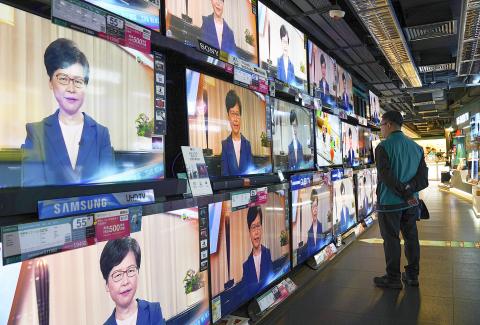Hong Kong Chief Executive Carrie Lam (林鄭月娥) yesterday said that her government would formally withdraw an extradition bill that has ignited months of protests.
In a five-minute televised address, Lam said that her government would withdraw the bill to “fully allay public concerns.”
“Our citizens, police and reporters have been injured during violent incidents,” Lam said. “There have been chaotic scenes at the airport and [mass transit railway] stations; roads and tunnels have been suddenly blocked.”

Photo: AP
“Visitors wonder whether our city is still a safe place for travel or business. Families and friends have been under stress and arguments have flared. For many people, Hong Kong has become an unfamiliar place,” she added.
Lam shelved the bill in June and in July said that it was “dead,” but has until now refused to withdraw it entirely, a key demand of the protesters who said it could be revived.
By formally withdrawing the bill, Lam conceded to one of five key demands of the demonstrators, but did not concede to the others, which include an independent inquiry into police behavior, amnesty to those arrested and democratic reforms to give Hong Kong residents universal suffrage.
Lam said that she did not believe the government should establish an inquiry to look into police behavior, deferring to the Independent Police Complaints Council, to which she said she would add two new members.
Instead, Lam said that her government would open a platform for dialogue, inviting community leaders, experts and others to investigate social issues and advise the government.
“After more than two months of social unrest, it is obvious to many that discontentment extends far beyond the bill,” she said.
As news of the bill’s withdrawal spread, riot police were seen patrolling metro stations as some protesters called for people to gather at various stations.
“Of course I won’t accept it. We have five demands. We want all of them, not one less. The most important issue to be solved is the police abuse of power,” a protester named Alan said.
A survey released yesterday of private business activity showed the “steepest deterioration in the health of the private sector since February 2009.”
Ahead of Lam’s speech, Hong Kong’s Hang Seng Index jumped 4 percent.
University and secondary students this week launched a class boycott and protesters have planned further action in the weeks ahead, including another attempt to paralyze the airport and a rally outside the US consulate to call on lawmakers to pass legislation that would sanction officials deemed as suppressing freedom or human rights in Hong Kong.
Protesters remained suspicious of Lam’s concession.
“She’s just doing this to try and disintegrate the movement. A lot of people think that,” a protester named Katya said. “The situation has escalated to a point where not even Beijing knows how to sort this, so they’re using different tricks and lies. Hong Kong people have learned to ignore her.”
Additional reporting by AP

A magnitude 7.0 earthquake struck off Yilan at 11:05pm yesterday, the Central Weather Administration (CWA) said. The epicenter was located at sea, about 32.3km east of Yilan County Hall, at a depth of 72.8km, CWA data showed There were no immediate reports of damage. The intensity of the quake, which gauges the actual effect of a seismic event, measured 4 in Yilan County area on Taiwan’s seven-tier intensity scale, the data showed. It measured 4 in other parts of eastern, northern and central Taiwan as well as Tainan, and 3 in Kaohsiung and Pingtung County, and 2 in Lienchiang and Penghu counties and 1

FOREIGN INTERFERENCE: Beijing would likely intensify public opinion warfare in next year’s local elections to prevent Lai from getting re-elected, the ‘Yomiuri Shimbun’ said Internal documents from a Chinese artificial intelligence (AI) company indicated that China has been using the technology to intervene in foreign elections, including propaganda targeting Taiwan’s local elections next year and presidential elections in 2028, a Japanese newspaper reported yesterday. The Institute of National Security of Vanderbilt University obtained nearly 400 pages of documents from GoLaxy, a company with ties to the Chinese government, and found evidence that it had apparently deployed sophisticated, AI-driven propaganda campaigns in Hong Kong and Taiwan to shape public opinion, the Yomiuri Shimbun reported. GoLaxy provides insights, situation analysis and public opinion-shaping technology by conducting network surveillance

‘POLITICAL GAME’: DPP lawmakers said the motion would not meet the legislative threshold needed, and accused the KMT and the TPP of trivializing the Constitution The Legislative Yuan yesterday approved a motion to initiate impeachment proceedings against President William Lai (賴清德), saying he had undermined Taiwan’s constitutional order and democracy. The motion was approved 61-50 by lawmakers from the main opposition Chinese Nationalist Party (KMT) and the smaller Taiwan People’s Party (TPP), who together hold a legislative majority. Under the motion, a roll call vote for impeachment would be held on May 19 next year, after various hearings are held and Lai is given the chance to defend himself. The move came after Lai on Monday last week did not promulgate an amendment passed by the legislature that

AFTERMATH: The Taipei City Government said it received 39 minor incident reports including gas leaks, water leaks and outages, and a damaged traffic signal A magnitude 7.0 earthquake struck off Taiwan’s northeastern coast late on Saturday, producing only two major aftershocks as of yesterday noon, the Central Weather Administration (CWA) said. The limited aftershocks contrast with last year’s major earthquake in Hualien County, as Saturday’s earthquake occurred at a greater depth in a subduction zone. Saturday’s earthquake struck at 11:05pm, with its hypocenter about 32.3km east of Yilan County Hall, at a depth of 72.8km. Shaking was felt in 17 administrative regions north of Tainan and in eastern Taiwan, reaching intensity level 4 on Taiwan’s seven-tier seismic scale, the CWA said. In Hualien, the